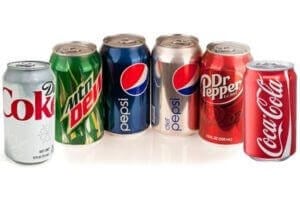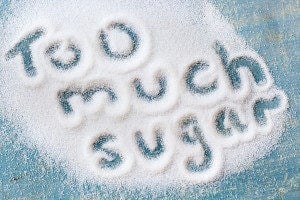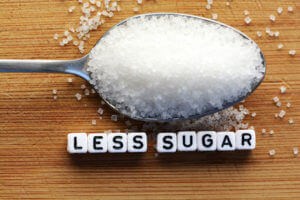What's the skinny on sodas?
 By Karla Vital, MD
By Karla Vital, MD
With a new day, comes new confusion about diet sodas and artificial sweeteners. The debate continues to rage about what is better, regular or diet. Since many people have exchanged their regular drinks for diet, this is a very important issue. What was once thought to be helpful, may actually carry some risk. Although avoiding soda completely would be best, there may be some benefit in reducing your overall intake first until you can find an unsweetened replacement. However, should we be wary of using excess artificial sweeteners? I will narrow down the latest information in an effort to make things clear. Why is this important?  Sugar sweetened beverages have been shown to increase the rate of obesity and it’s related diseases. They account for the largest source of dietary sugar, so eliminating them would be ideal. Thus in the search for the perfect replacement for sugar, there has been an increase in the number and use of artificial sweeteners (or non-nutritive sweeteners). The intake of sugary beverages often leads to increased energy intake, weight gain, dental caries, and less room to consume healthier alternatives. Since free sugars include those that are added as well as those that naturally occur in fruit juices, there is a need to monitor the intake of all sweetened beverages. In 2015, the World Health Organization published guidelines for children and adults for daily recommended sugar intake. They recommended reducing all sugars to no more than 10% of total daily intake, and further limiting sugar intake to 5% of total daily intake to reduce the lifetime risk of dental cavities. Are some sweeteners better than others?
Sugar sweetened beverages have been shown to increase the rate of obesity and it’s related diseases. They account for the largest source of dietary sugar, so eliminating them would be ideal. Thus in the search for the perfect replacement for sugar, there has been an increase in the number and use of artificial sweeteners (or non-nutritive sweeteners). The intake of sugary beverages often leads to increased energy intake, weight gain, dental caries, and less room to consume healthier alternatives. Since free sugars include those that are added as well as those that naturally occur in fruit juices, there is a need to monitor the intake of all sweetened beverages. In 2015, the World Health Organization published guidelines for children and adults for daily recommended sugar intake. They recommended reducing all sugars to no more than 10% of total daily intake, and further limiting sugar intake to 5% of total daily intake to reduce the lifetime risk of dental cavities. Are some sweeteners better than others?  Perhaps. Seven artificial sweeteners are FDA approved, and acceptable daily intake limits are set based on the level of where 1% of people will experience adverse effects. Some of the most studied sweeteners include Aspartame (Nutrasweet and Equal), Sucralose (Splenda), Saccharin (Sweet’N’Low), Acesulfame (Sweet One), and sugar alcohols such as Xylitol (which end in -ol). According to the Academy of Nutrition and Dietetics, all nutritive sweeteners are considered safe. Therefore, if artificial sweeteners are used to limit overall carbohydrate intake, they can be included as a part of a dietary plan. Although the majority of the studies have been inconclusive with regards to cancer risks, a 2017 review from Dr. Azad and colleagues have linked artificial sweeteners to increases in weight and waist circumference, and higher incidence of obesity, hypertension, metabolic syndrome, Type 2 diabetes and cardiovascular events. Another study by Dr. Suez and colleagues in 2014, showed artificial sweeteners may promote obesity and induce glucose intolerance by altering the microbiome of the gut. Due to the lack of separation of sweetener types, more evidence is still needed to determine differences between the artificial sweeteners. Of the non-nutritive sweeteners, the natural plant-based compounds appear to have the least effects on blood glucose and Insulin levels. Thus, Stevia (from the plant Stevia rebaudiana) and Monk fruit (luo han guo), would be considered the safest choices. So is there a consensus?
Perhaps. Seven artificial sweeteners are FDA approved, and acceptable daily intake limits are set based on the level of where 1% of people will experience adverse effects. Some of the most studied sweeteners include Aspartame (Nutrasweet and Equal), Sucralose (Splenda), Saccharin (Sweet’N’Low), Acesulfame (Sweet One), and sugar alcohols such as Xylitol (which end in -ol). According to the Academy of Nutrition and Dietetics, all nutritive sweeteners are considered safe. Therefore, if artificial sweeteners are used to limit overall carbohydrate intake, they can be included as a part of a dietary plan. Although the majority of the studies have been inconclusive with regards to cancer risks, a 2017 review from Dr. Azad and colleagues have linked artificial sweeteners to increases in weight and waist circumference, and higher incidence of obesity, hypertension, metabolic syndrome, Type 2 diabetes and cardiovascular events. Another study by Dr. Suez and colleagues in 2014, showed artificial sweeteners may promote obesity and induce glucose intolerance by altering the microbiome of the gut. Due to the lack of separation of sweetener types, more evidence is still needed to determine differences between the artificial sweeteners. Of the non-nutritive sweeteners, the natural plant-based compounds appear to have the least effects on blood glucose and Insulin levels. Thus, Stevia (from the plant Stevia rebaudiana) and Monk fruit (luo han guo), would be considered the safest choices. So is there a consensus?  Yes, consume less sugar from all sources. Excess sugary drinks can double the risk of heart disease with as little as 24 oz/day (2 cans of soda). Researchers from Emory University looked at 18,000 people over age 45 and followed them for 6 years. Their study showed that the “risk of dying from heart disease was 2.5 times higher for the people who drank the most sugar-sweetened beverages”. However, this also included fruit juices, and fruit drinks. So, despite the effort to find the perfect replacement for sugar, it may not be possible. Alternative sweeteners provide options for people looking to cut down on calories and excess sugars but may still carry some risk. Although they may not result in weight loss, they allow people to consume less sugar initially, until they increase their intake of unsweetened beverages. The bottom line is artificial sweeteners still carry some risk, so using them in limited amounts is recommended. Dr. Karla Vital is a Board Certified Nephrologist and Obesity Medicine Physician who is accepting new patients in Houston, Texas. She can be reached for questions or comments about this article on Twitter @drkarlavital, or on Facebook @vitalhealthandwellness. She is also now seeing patients via telemedicine at https://www.rowedocs.com/dr-karla-vital/
Yes, consume less sugar from all sources. Excess sugary drinks can double the risk of heart disease with as little as 24 oz/day (2 cans of soda). Researchers from Emory University looked at 18,000 people over age 45 and followed them for 6 years. Their study showed that the “risk of dying from heart disease was 2.5 times higher for the people who drank the most sugar-sweetened beverages”. However, this also included fruit juices, and fruit drinks. So, despite the effort to find the perfect replacement for sugar, it may not be possible. Alternative sweeteners provide options for people looking to cut down on calories and excess sugars but may still carry some risk. Although they may not result in weight loss, they allow people to consume less sugar initially, until they increase their intake of unsweetened beverages. The bottom line is artificial sweeteners still carry some risk, so using them in limited amounts is recommended. Dr. Karla Vital is a Board Certified Nephrologist and Obesity Medicine Physician who is accepting new patients in Houston, Texas. She can be reached for questions or comments about this article on Twitter @drkarlavital, or on Facebook @vitalhealthandwellness. She is also now seeing patients via telemedicine at https://www.rowedocs.com/dr-karla-vital/